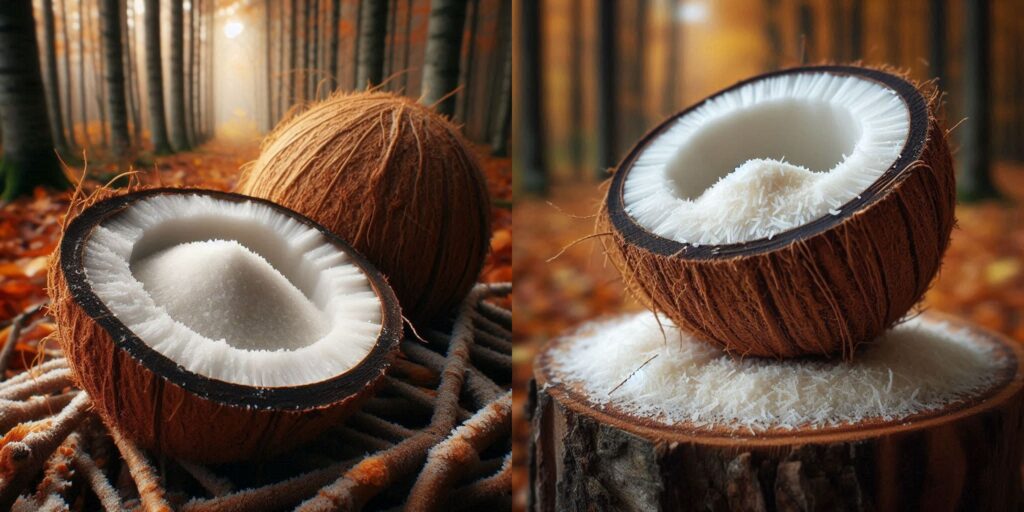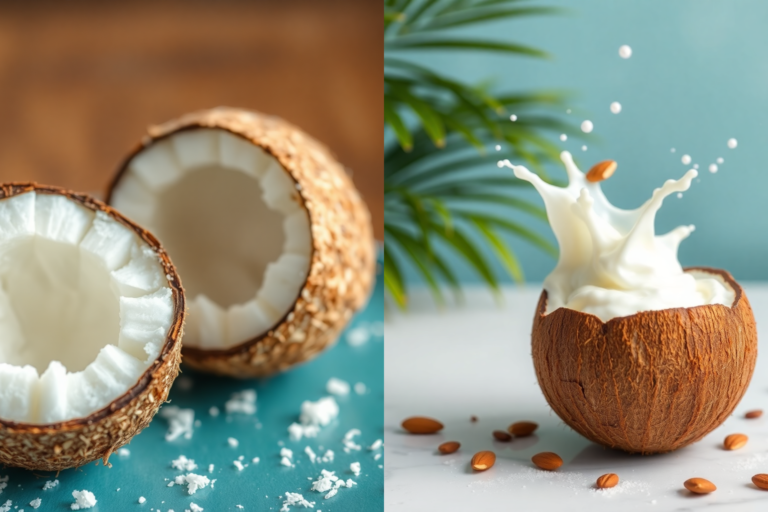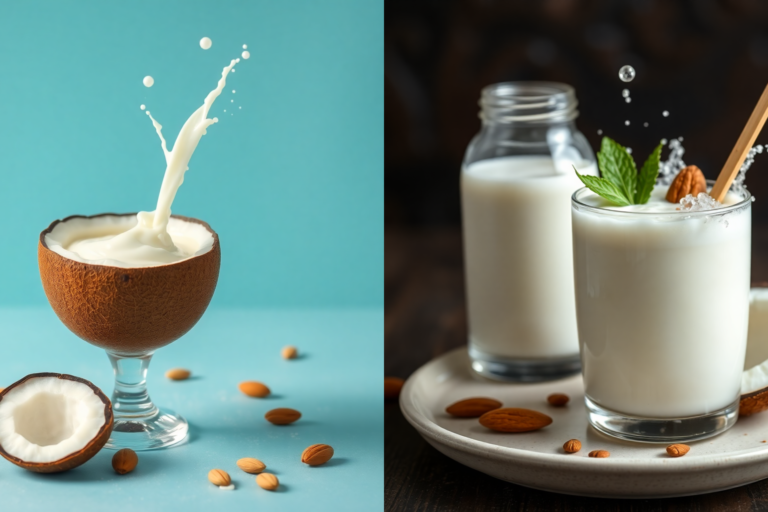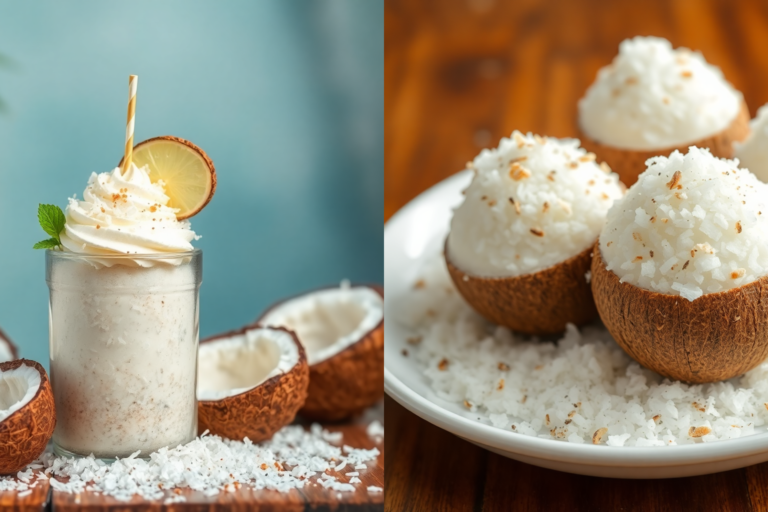Introduction to Desiccated Coconut: A Versatile Ingredient for Healthy Living
What is Desiccated Coconut?
Desiccated coconut is finely shredded, dried coconut meat that is used as an ingredient in a variety of dishes. Unlike fresh coconut, which has a higher water content, desiccated coconut is completely dry and long-lasting, making it a staple in both kitchens and pantries. This versatile ingredient adds a delightful texture and rich flavor to many recipes, ranging from baked goods to savory dishes. Its unique combination of nutrients has also contributed to its rise in popularity among health-focused consumers.
Why is Desiccated Coconut Gaining Popularity?
The growing trend toward healthier eating and whole food ingredients has brought desiccated coconut into the spotlight. As more people seek low-carb, nutrient-rich options, desiccated coconut has become an essential part of diets such as keto, paleo, and gluten-free. This ingredient’s versatility means it can be incorporated into a wide range of meals, including snacks, breakfast dishes, and even beverages, making it a top choice for those aiming to combine taste with nutritional benefits.
Health Benefits of Desiccated Coconut
One of the main reasons desiccated coconut has become so popular is its nutrient profile. It’s not only delicious but is also packed with healthy fats, fiber, and essential minerals. This makes it an ideal addition to your diet if you’re looking to boost energy, improve digestion, or simply add more nutrients to your meals. The natural flavors and nutrients in desiccated coconut make it a powerful ingredient to include in both sweet and savory recipes.
Culinary Uses of Desiccated Coconut
Desiccated coconut’s unique properties make it a versatile ingredient that can be used in various ways. Whether added to oatmeal or sprinkled over salads, it offers both flavor and a nutritional boost. In baking, it can enhance the texture of muffins, cakes, and cookies, providing a touch of natural sweetness. For savory dishes, desiccated coconut can be used in curries, soups, and as a coating for fried or baked foods, adding a subtle coconut flavor and extra crunch.
Reason 1: Nutritional Powerhouse
Desiccated coconut is a nutrient-dense ingredient that provides a range of essential vitamins, minerals, and healthy fats that are beneficial for overall health and well-being. As a versatile and popular ingredient in both sweet and savory dishes, desiccated coconut offers numerous nutritional benefits that can enhance your diet. This section highlights the key nutrients found in desiccated coconut and the advantages they bring to your health.
Essential Nutrients Found in Desiccated Coconut
Desiccated coconut is rich in fiber, healthy fats, vitamins, and minerals, making it a powerful addition to any diet. Here’s a closer look at the key components:
1. Fiber for Digestive Health
One of the standout nutrients in desiccated coconut is dietary fiber, which plays a crucial role in maintaining healthy digestion. A high fiber content can support regular bowel movements and prevent digestive issues such as constipation. Fiber also promotes the growth of healthy gut bacteria, contributing to a balanced digestive system and overall gut health.
2. Healthy Fats for Energy and Metabolism
Desiccated coconut is a great source of healthy fats, particularly medium-chain triglycerides (MCTs). These MCTs are easily digested and absorbed by the body, providing a quick and sustained energy source. MCTs can help boost metabolism, which aids in calorie burning and supports weight management. Unlike long-chain fatty acids found in many other foods, MCTs are metabolized rapidly and do not get stored as fat, making desiccated coconut a smart choice for those looking to maintain healthy energy levels throughout the day.
3. Vital Vitamins and Minerals
In addition to healthy fats and fiber, desiccated coconut is packed with a variety of essential vitamins and minerals. These include:
- Iron: Vital for the production of hemoglobin, which helps carry oxygen throughout the body. Iron deficiency can lead to fatigue and weakened immune function.
- Magnesium: Important for bone health, muscle function, and nerve transmission. It also helps regulate blood sugar and blood pressure levels.
- Zinc: Supports immune function, aids in cell division, and contributes to healthy skin and wound healing.
- Copper and Manganese: These trace minerals are involved in various enzymatic reactions that support metabolic processes and antioxidant defense.
4. Vitamins for Well-Being
Desiccated coconut also contains small amounts of B vitamins (such as B1, B3, B5, and B6) that support energy production, brain function, and overall metabolic health. The presence of vitamin E provides antioxidant properties that help fight free radicals and support skin health.
Benefits for Digestive Health, Energy, and Overall Nutrition
Incorporating desiccated coconut into your diet can have a variety of health benefits:
- Digestive Health: The high fiber content in desiccated coconut helps to regulate digestion, prevent constipation, and maintain a healthy gut. Regular consumption of fiber-rich foods like desiccated coconut can lead to better overall gut function.
- Sustained Energy: The MCTs in desiccated coconut are a source of quick energy, making it an ideal snack for those needing an energy boost. Whether you’re starting your day, pre-workout, or as a midday pick-me-up, desiccated coconut provides a satisfying and nutritious way to sustain energy levels.
- Nutrient Density: With its combination of healthy fats, fiber, and essential vitamins and minerals, desiccated coconut is a nutritional powerhouse that supports overall health. It can be used as a versatile addition to meals, from adding a nutritional boost to your morning smoothie to sprinkling over a salad or incorporating into baked goods.
Why Choose Desiccated Coconut?
Choosing desiccated coconut as a pantry staple provides a convenient way to enjoy these nutritional benefits. Whether you’re incorporating it into smoothies, homemade energy bars, desserts, or using it as a coating for meat and seafood, the versatility of desiccated coconut makes it easy to add this healthy ingredient to your diet. Plus, its long shelf life and ease of use mean that you can rely on desiccated coconut for quick, nutritious meals and snacks at any time.
Reason 2: Supports Weight Management
When it comes to weight management, incorporating desiccated coconut into your diet can be a strategic and nutritious choice. This versatile ingredient offers unique properties that not only enhance your meals but can also support your weight management goals. Here’s a closer look at how desiccated coconut can help promote satiety and manage cravings effectively.
Healthy Fats for Satiety and Appetite Control
One of the key nutritional benefits of desiccated coconut is its content of healthy fats, specifically medium-chain triglycerides (MCTs). Unlike long-chain triglycerides found in other sources of fats, MCTs are rapidly absorbed by the body and used as a quick source of energy. This fast absorption can help maintain steady blood sugar levels, preventing energy dips that often lead to hunger and cravings. Additionally, healthy saturated fats in desiccated coconut contribute to a feeling of fullness, helping to curb excessive eating and snacking throughout the day. By promoting a longer-lasting satiety, desiccated coconut can play an integral role in reducing overall calorie intake.
High Fiber Content to Support Digestive Health
Desiccated coconut is also rich in dietary fiber, a crucial component for weight management. Fiber adds bulk to your diet, which not only supports proper digestion but also helps regulate appetite by creating a sense of fullness. This makes it easier to avoid overeating and maintain a healthy eating pattern. The fiber in desiccated coconut can slow down the digestive process, which prolongs the feeling of satiety and can prevent sudden cravings for unhealthy snacks. By incorporating desiccated coconut into your meals, you can create a balanced approach that supports hunger control and promotes healthy eating habits.
Role in Boosting Metabolism
In addition to promoting satiety, desiccated coconut is known for its potential to boost metabolism. The MCTs found in desiccated coconut are metabolized differently from long-chain fats; they are transported directly to the liver, where they can be quickly converted into energy and not stored as body fat. This process can result in an increased metabolic rate, aiding the body’s natural ability to burn calories more efficiently. When combined with regular physical activity and a well-rounded diet, the metabolism-boosting properties of desiccated coconut can contribute to healthier weight management and potential weight loss.
How to Use Desiccated Coconut for Weight Management
Incorporating desiccated coconut into your diet can be simple and delicious. Add it to your breakfast oatmeal or smoothie bowls for added texture and nutrition. You can also sprinkle desiccated coconut on top of salads, mix it into yogurt, or use it as a base for energy bites and snack bars that satisfy cravings without compromising your weight management goals. When using desiccated coconut in your cooking, be mindful of portion sizes to reap the benefits without overconsumption.
Reason 3: Versatile in Cooking and Baking
Desiccated coconut is an incredibly versatile ingredient that can transform a variety of dishes, from sweet to savory, adding unique flavor, texture, and nutritional value. Its adaptability makes desiccated coconut a must-have pantry item for home cooks and professional chefs alike. Whether you’re making a nutritious snack, a decadent dessert, or a flavorful main dish, desiccated coconut can be seamlessly incorporated into your recipes.
Creative Ways to Incorporate Desiccated Coconut
Smoothies and Beverage Blends
Add a handful of desiccated coconut to your morning smoothie to infuse it with a subtle nutty flavor and extra fiber. Mix it with tropical fruits like pineapple, mango, and banana for a refreshing drink or blend it with dark chocolate and almond milk for an indulgent treat. The natural fats in desiccated coconut help create a creamy consistency and make your smoothies more filling.Baked Goods
Desiccated coconut is perfect for baking, adding moisture and texture to cakes, muffins, and cookies. Coconut muffins with a hint of vanilla or a coconut chocolate chip cookie recipe can take your baked goods to the next level. You can use desiccated coconut as a topping for cakes and cupcakes or as an ingredient in doughs and batters for added richness. Try a classic coconut bread recipe or blend it with shredded coconut for a coconut flour cake that’s moist and full of flavor.Homemade Snack Bars and Energy Bites
For a quick, nutritious snack, combine desiccated coconut with oats, nuts, and a sweetener like honey or maple syrup to create homemade energy bars. Press the mixture into a baking dish, chill, and cut into squares for an easy grab-and-go snack. You can also roll these ingredients into bite-sized balls for no-bake energy bites that are perfect for satisfying your mid-day hunger.Savory Dishes
While desiccated coconut is often associated with sweet treats, it can also be used to add depth to savory dishes. Stir it into curries, stews, and soups to impart a subtle, rich flavor. Try adding it to coconut chicken curry for an extra layer of texture or use it as a coating for chicken or fish for a crispy, golden crust. The natural sweetness of desiccated coconut pairs well with spices and adds a unique twist to traditional dishes.Toppings and Garnishes
Sprinkle desiccated coconut on top of salads, yogurt, or oatmeal for an added crunch and flavor boost. It makes a wonderful garnish for tropical salads featuring pineapple, mango, and avocado or for breakfast bowls with chia seeds, banana slices, and a drizzle of honey. You can even toast desiccated coconut in a pan for a few minutes to intensify its flavor and use it as a crunchy topping for desserts or snacks.
Quick Serving Ideas Using Desiccated Coconut
- Coconut Energy Balls: Mix desiccated coconut with peanut butter, oats, and a touch of maple syrup. Roll into small balls and chill for a healthy snack.
- Coconut Pancakes: Add desiccated coconut to pancake batter for a tropical twist on breakfast.
- Coconut Rice: Stir desiccated coconut into your rice as it cooks for an aromatic side dish that pairs perfectly with curries and grilled meats.
Desiccated coconut is not just a nutritious ingredient; it’s also a creative addition to your culinary repertoire. Its ability to enhance both sweet and savory dishes makes it an essential for anyone looking to add variety and nutrition to their meals. Whether you’re experimenting with new recipes or sticking to your go-to favorites, desiccated coconut is a versatile, healthy option that will never disappoint.
By incorporating desiccated coconut into your cooking and baking, you can enjoy its delightful flavor and texture while reaping its numerous health benefits.
Reason 4: Potential Benefits for Heart Health
The Heart-Healthy Properties of Fats in Desiccated Coconut
Desiccated coconut is often praised for its unique composition of healthy fats, specifically medium-chain triglycerides (MCTs). Unlike long-chain triglycerides found in many other sources of fat, MCTs in desiccated coconut are metabolized differently. They are rapidly absorbed by the body and converted into energy, without the need for digestive enzymes that are required for longer-chain fats. This efficient metabolism may help maintain healthy cholesterol levels and support cardiovascular health.
The saturated fats found in desiccated coconut are primarily made up of lauric acid, which has been shown to have positive effects on heart health. Unlike the saturated fats found in red meat or certain processed foods, the saturated fats in desiccated coconut can increase levels of high-density lipoprotein (HDL), often known as “good” cholesterol. Higher HDL levels can contribute to a lower risk of heart disease by promoting the removal of low-density lipoprotein (LDL) or “bad” cholesterol from the bloodstream.
How Desiccated Coconut Contributes to Cholesterol Management
Regular consumption of desiccated coconut has the potential to aid in cholesterol management. Research suggests that lauric acid, a key component of the fats in desiccated coconut, may have a balancing effect on blood lipid levels. By increasing HDL cholesterol, desiccated coconut can play a role in reducing the ratio of LDL to HDL, which is a vital marker for heart disease risk. This balance can help prevent the buildup of arterial plaque, a primary contributor to heart attacks and strokes.
In addition, the fiber content in desiccated coconut also contributes to heart health. Dietary fiber helps lower cholesterol by binding with bile acids in the digestive system and aiding in their removal from the body. This process prompts the liver to convert more cholesterol into bile acids, effectively reducing the levels of LDL cholesterol in the blood. Thus, desiccated coconut not only supports heart health with its healthy fats but also enhances it with its fiber-rich profile.
Cardiovascular Well-Being and the Role of Desiccated Coconut
The health benefits of desiccated coconut extend to overall cardiovascular well-being. Including desiccated coconut in a balanced diet can contribute to heart health by supporting the function of blood vessels and maintaining blood pressure levels. The healthy fats in desiccated coconut are believed to have anti-inflammatory properties that can help reduce the risk of chronic inflammation—a major contributor to cardiovascular disease.
Adding desiccated coconut to meals can be as simple as sprinkling it on top of smoothies, mixing it into oatmeal, or using it in baking. By incorporating desiccated coconut into your diet, you’re not only adding a delicious ingredient but also a heart-healthy food that may help maintain cholesterol levels and promote better heart function over time.
Reason 5: Gluten-Free and Allergen-Friendly
Desiccated Coconut: A Safe Choice for Gluten-Free Diets
Desiccated coconut is an excellent option for those looking to avoid gluten in their diet. As a naturally gluten-free ingredient, desiccated coconut can be seamlessly incorporated into a variety of recipes to cater to individuals with gluten intolerance, celiac disease, or gluten sensitivity. Unlike many processed grains or flours that may contain hidden gluten or cross-contamination risks, desiccated coconut provides a pure, uncontaminated source of nourishment that can be confidently used in both sweet and savory dishes.
Benefits of Desiccated Coconut for Creating Gluten-Free and Allergy-Friendly Dishes
One of the most appealing aspects of desiccated coconut is its ability to serve as a versatile base for gluten-free baking and cooking. It can be used as an ingredient in gluten-free flours or as a binding agent in recipes that require a bit more structure, like cookies, muffins, or bread. Its naturally rich, mildly sweet flavor enhances recipes without overpowering other ingredients.
Desiccated coconut is also free from the common allergens found in many grains, such as wheat, barley, and rye, making it an excellent alternative for those with grain-based allergies. Additionally, desiccated coconut can be used in recipes that cater to other dietary needs, as it doesn’t contain nuts, soy, dairy, or other common allergens. This makes it a perfect choice for families or individuals who need to prepare meals that are both allergy-friendly and satisfying.
Incorporating Desiccated Coconut into Allergy-Friendly Recipes
When it comes to incorporating desiccated coconut into meals, there is no shortage of options. For breakfast, try adding desiccated coconut to oatmeal or homemade granola to provide a boost of flavor and texture. You can also use desiccated coconut in smoothies, mixed with fruits and dairy-free milk, for a tropical, energy-boosting drink.
For baked goods, desiccated coconut can be added to recipes like coconut flour cookies, macaroons, and gluten-free cakes, providing not only a unique flavor but also a boost of fiber and healthy fats. Beyond baking, desiccated coconut can be used in savory dishes, such as curries and salads, adding texture and depth to your meals without introducing allergens.
Why Choose Desiccated Coconut Over Other Ingredients?
The allergen-friendly nature of desiccated coconut sets it apart from many other gluten-free ingredients, which might still trigger allergies due to cross-contamination or the presence of hidden ingredients. By opting for desiccated coconut, you’re choosing an ingredient that is minimally processed, highly nutritious, and adaptable to various culinary applications.
The natural composition of desiccated coconut, rich in healthy fats, dietary fiber, and essential minerals, enhances the nutritional profile of any dish while remaining suitable for a wide range of dietary restrictions. For individuals seeking a gluten-free and allergen-friendly diet, desiccated coconut is a pantry staple that can help ensure safe and enjoyable meals.
Conclusion: Embrace the Benefits of Desiccated Coconut
Recap of the Benefits of Adding Desiccated Coconut to Your Diet
Desiccated coconut is more than just a versatile ingredient; it is a nutritional powerhouse that can enrich your diet in several ways. From its healthy fat content that fuels your body with sustained energy to its high fiber that supports digestion, desiccated coconut packs a range of essential nutrients that make it an outstanding addition to your meals. With minerals like iron, magnesium, and zinc, it helps maintain your overall health and supports bodily functions crucial for well-being. Moreover, its natural, low-carb profile makes it a keto-friendly option for those looking to manage their carbohydrate intake.
One of the most unique aspects of desiccated coconut is its rich content of medium-chain triglycerides (MCTs), which can provide a quick and lasting energy boost. Additionally, the lauric acid found in desiccated coconut is known for its antibacterial and antiviral properties, making it an ideal choice for supporting the immune system. With its gluten-free nature, desiccated coconut is perfect for those with dietary restrictions, adding variety and nutrition to gluten-free meals.
Try Desiccated Coconut in Your Favorite Recipes for a Nutritious Boost
Incorporating desiccated coconut into your diet is simple and can be done in a variety of delicious ways. Whether you’re making a batch of coconut muffins, adding it to your smoothie for an added texture, or using it as a crunchy topping for salads and yogurt, desiccated coconut can enhance your recipes with both flavor and nutrition. The versatility of desiccated coconut also allows it to be used in savory dishes such as coconut-based curries and as a coating for proteins like chicken or fish, bringing out its subtle sweetness and unique texture.
Not only does desiccated coconut elevate the taste and nutrition of your dishes, but its long shelf life and convenient form make it an essential pantry staple. Whether you use it in daily cooking or baking, the health benefits of desiccated coconut can be easily accessed and enjoyed on a regular basis.
Make Desiccated Coconut a Part of Your Daily Routine
By adding desiccated coconut to your meals, you can take advantage of its many nutritional benefits while diversifying your food choices. From aiding digestion and promoting gut health to supporting energy levels and immune function, desiccated coconut is a simple yet powerful way to enhance your diet. Its unique combination of healthy fats, fiber, and essential minerals makes it a must-have for those looking to boost their health and add exciting flavors to their meals. Try experimenting with different recipes and discover how this versatile ingredient can make a difference in your everyday nutrition.











